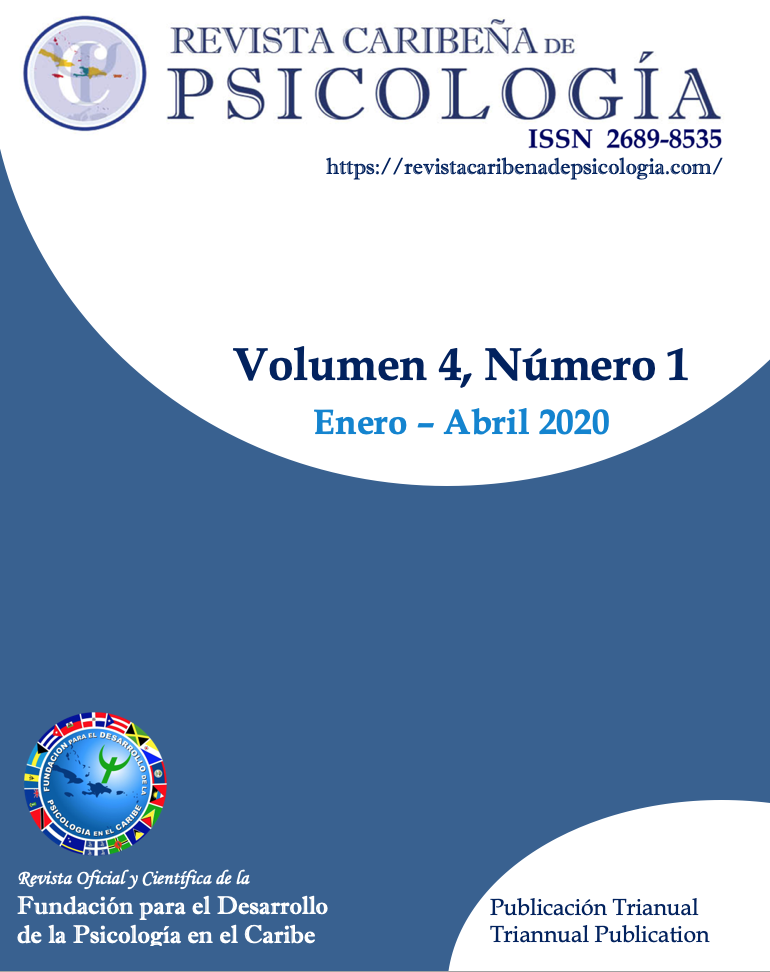Propiedades Psicométricas de la Escala de Pasión Laboral (EPL) en una Muestra de Adultos en Puerto Rico
DOI:
https://doi.org/10.37226/rcp.v4i1.1829Keywords:
work passion, structural equation modeling, positive psychology, validityAbstract
Work passion is a persistent state of desire, based on cognitive and affective evaluations of job. This has been conceptualized as a two-factor construct (harmonious passion and obsessive passion). The aim of this research was developing an alternative measure of work passion and analyze its psychometric properties. To do this, items were developed based on the Dualistic Model of Passion, we analyze the content validity as well as the psychometric properties of the scale. The obtained results bring evidence of the two-factor structure of the Work Passion Scale and its adequate psychometric properties for being use in research and organizational diagnosis in Puerto Rico.
References
Bagozzi, R. P., & Yi, Y. (1988). On the evaluation of structural equation models. Journal of the Academy of Marketing Science, 16(1), 74-94. https://doi.org/10.1007/BF02723327
Balon, S., Lecoq, J., & Rimé, B. (2013). Passion and personality: Is passionate behaviour a function of personality? European Review of Applied Psychology, 63, 59-65. https://doi.org/10.1016/j.erap.2012.06.001
Birkeland, I. (2015). Obsessive passion for work and organizational citizenship behaviour: A curvilinear investigation. Academy of Management Annual Meeting Proceedings, 1-1. https://doi.org/10.5465/AMBPP.2015.16076
Burke, R., Astakhova, M., & Hang, H. (2015). Work passion through the lens of culture: Harmonious work passion, obsessive work passion, and work outcomes in Russia and China. Journal of Business & Psychology, 30, 457-471. https://doi.org/10.1007/s10869-014-9375-4
Byrne, B. M. (2010). Structural equation modeling with AMOS: Basic concepts, applications, and programming. Psychology Press.
Chamarro, A., Penelo, E., Fornieles, A., Oberst, U., Vallerand, R. J., & Fernandez-Castro, J. (2015). Psychometric properties of the Spanish version of the passion scale. Psicothema, 27(4), 402–409. https://doi.org/10.7334/psicothema2015.80
Champion, D. J. (1981). Basic statistics for social research (2nd ed.). McMillan.
Deci, E. L., & Ryan, R. M. (1985). Intrinsic motivation and self-determination in human behavior. Plenum.
Deci, E. L., Eghrari, H., Patrick, B. C., & Leone, D. R. (1994). Facilitating internalization: The self-determination theory perspective. Journal of Personality, 62(1), 119–142.
Dubreuil, P., Forest, J., & Courcya, F. (2014). From strengths use to work performance: The role of harmonious passion, subjective vitality, and concentration. Journal of Positive Psychology, 9(4), 335-349. https://doi.org/10.1080/17439760.2014.898318
Fernet, C., Lavigne, G., Vallerand, R., & Austin, S. (2014). Fired up with passion: Investigating how job autonomy and passion predict burnout at career start in teachers. Work & Stress, 28, 270-288. https://doi.org/10.1080/02678373.2014.935524
Field, A. (2018). Discovering statistics using IBM SPSS Statistics (5th ed.). Sage.
Forest, J., Mageau, G., Sarrazin, C., & Morin, E. (2011). Work is my passion: The different affective, behavioural, and cognitive consequences of harmonious and obsessive passion toward work. Canadian Journal of Administrative Sciences, 28(1), 17-30. https://doi.org/10.1002/cjas.170
Graves, L. M., Ruderman, M. N., Ohlott, P. J., & Weber, T. J. (2012). Driven to work and enjoyment of work: Effects on managers’ outcomes. Journal of Management, 38, 1655-1680. https://doi.org/10.1177/0149206310363612
Houlfort, N. Philippe, F., Vallerand, R., & Ménard, J. (2014). On passion and heavy work investment: Personal and organizational outcomes. Journal of Managerial Psychology, 29(1), 25-45. https://doi.org/10.1108/JMP-06-2013-0155
Houlfort, N., Philippe, F., Bourdeau, S., & Leduc, C. (2017). A comprehensive understanding of the relationships between passion for work and work–family conflict and the consequences for psychological distress. International Journal of Stress Management. https://doi.org/10.1037/str0000068
Johri, R., Misra, R. K., & Bhattacharjee, S. (2016). Work passion: Construction of reliable and valid measurement scale in the Indian context. Global Business Review, 17(3S), 148S–158S. https://doi.org/10.1177/0972150916631206
Lavigne, G., Forest, J., Fernet, C., & Crevier-Braud, L. (2014). Passion at work and workers’ evaluations of job demands and resources: A longitudinal study. Journal of Applied Social Psychology, 44, 255-265. https://doi.org/10.1111/jasp.12209
Littlewood-Zimmerman, H. F., & Bernal-García, E. R. (2011). Mi primer modelamiento de ecuación estructural: LISREL. Centro de Investigaión en Comportamiento Organizacional (CINCEL).
Montero, I., & León, O. G. (2007). A guide for naming research studies in psychology. International Journal of Clinical and Health Psychology, 7(3), 847-862.
Orgambídez-Ramos, A., Borrego-Alés, Y., & Gonçalves, G. (2014). Passionate workers: A Spanish adaptation of the passion scale. Revista de Psicología del Trabajo y de las Organizaciones, 30(2), 43–48. https://doi.org/10.1016/j. rpto.2014.06.005
Ortega-Santori, C., Martínez-Lugo, M., & Rodríguez-Montalbán, R. (2016). La pasión por el trabajo, ¿vino viejo en botella nueva?: Un análisis psicométrico de la escala de pasión por el trabajo de Vallerand et al. Revista Interamericana de Psicología Ocupacional, 35(2), 68–78. https://doi.org/10.21772/ripo.v35n2a02
Perrewé, P., Hochwarter, W., Ferris, G., McAllister, C., & Harris, J. (2014). Developing a passion for work passion: Future directions on an emerging construct. Journal of Organizational Behaviour, 35(1), 145-150. https://doi.org/10.1002/job.1902
Salessi, S., Omar, A., & Vaamonde, J. D. (2017). Conceptual considerations of work passion. Ciencias Psicológicas, 11(2), 165–178. https://doi.org/10.22235/cp.v11i2.1488
Satorra, A., & Bentler, P. M. (2001). A scaled difference chi-square test statistic for moment structure analysis. Psychometrika, 66(4), 507-514. https://doi.org/10.1007/BF02296192
Schlenker, B. R. (1985). Indentity and self-identification. In B. R. Schlenker (Ed.), The self and social life (pp. 65–99). McGraw-Hill.
Schumacker, R. E., & Lomax, R. G. (2010). A beginner's guide to structural equation modeling (3rd ed.). Erlbaum.
Serrano-Fernández, M. J., Boada-Grau, J., Gil-Ripoll, C., & Vigil-Colet, A. (2017). Spanish adaptation of the passion toward work scale (PTWS). Anales de Psicología, 33(2), 403–410. https://doi.org/10.6018/analesps.33.2.240521
Thorgren, S., Wincent, J., & Sirén, C. (2013). The influence of passion and work-life thoughts on work satisfaction. Human Resource Development Quarterly, 24, 469-492. 24. https://doi.org/10.1002/hrdq.21172
Trepanier, S., Fernet, C., Austin, S., Forest, J., & Vallerand, R. (2014). Linking job demands and resources to burnout and work engagement: Does passion underlie these differential relationships? Motivation & Emotion, 38, 353-366. https://doi.org/10.1007/s11031-013-9384-z
Vallerand, R. (2015). The psychology of passion. A dualistic model. Oxford University Press.
Vallerand, R. J., & Houlfort, N. (2003). Passion at work: Toward a new conceptualization. En S. W. Gilliland, D. Steiner, & D. Skarlicki (Eds.), Emerging perspectives on values in organizations (pp. 175-204). Information Age Publishing.
Vallerand, R. J., Blanchard, C., Mageau, G. a, Koestner, R., Ratelle, C., Leonard, M., & Marsolais, J. (2003). Les passions de l’ame: On obsessive and harmonious passion. Journal of Personality and Social Psychology, 85(4), 756–67. https://doi.org/10.1037/0022-3514.85.4.756
Vallerand, R., Houlfort, N., & Forest, J. (2014). Passion for work: Determinants and outcomes. In M. Gagné (Ed.), The Oxford handbook of work engagement, motivation, and self-determination theory (pp. 85-105). Oxford University Press.
Vallerand, R., Paquet, Y., Philippe, F., & Charest, J. (2010). On the role of passion for work in burnout: A process model. Journal of Personality, 78, 289-312. https://doi.org/10.1111/j.1467-6494.2009.00616.x
Zito, M., & Colombo, L. (2017). The Italian version of the passion for work scale: First psychometric evaluations. Journal of Work and Organizational Psychology, 33, 47–53. https://doi.org/10.1016/j.rpto.2017.01.003







